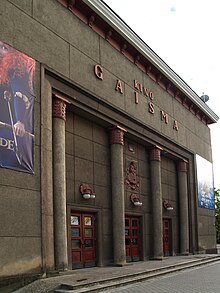Latvian cinema
| Cinema of Latvia | |
|---|---|

Kino Gaisma Valmieras
|
|
| No. of screens | 63 (2011) |
| • Per capita | 3.4 per 100,000 (2011) |
| Main distributors |
Forum Cinemas 57.5% Acme Film Latvia 16.5% Incognito Films 5.6 |
| Produced feature films (2011) | |
| Fictional | 4 |
| Animated | 1 |
| Documentary | 1 |
| Number of admissions (2011) | |
| Total | 1,879,149 |
| • Per capita | 1.13 (2012) |
| National films | 66,337 (3.5%) |
| Gross box office (2011) | |
| Total | EUR 7.54 million |
| National films | EUR 98,625 (1.3%) |
Cinema of Latvia dates back to 1910 when the first short films were made. The first cinematic screening in Riga took place on May 28, 1896. By 1914 all major cities in Latvia had cinemas where newsreels, documentaries and mostly foreign made short films were screened.
Two years after cinema was invented by Lumiere brothers, on 22 January 1898 Sergei Eisenstein was born in Riga.
The first Latvian feature film Lāčplēsis directed by Aleksandrs Rusteiķis was released in 1930. The Fisherman's Son (1939), directed by Vilis Jānis Lapenieks, is considered a Latvian classic ending the era of filmmaking before the outbreak of World War II.
After the Soviet occupation of Latvia in 1940 Lapenieks emigrated and after the end of the war his son Vilis Lapenieks began his film-making career abroad where he has been credited internationally as cinematographer on more than 63 titles.
The Riga Documentary Film Studio was created in Latvia during the first year of Soviet occupation. During the first decades of Soviet rule filmmakers in Latvia were coming mostly from Soviet Russia creating propaganda films to depict the victory of Socialism.
After the death of Stalin in 1953 a more liberal period in Soviet Union's cultural policies followed. Filmmakers started to enjoy greater artistic control at the same time the Soviet State Committee for Cinematography (Goskino) in Moscow provided the money, state censorship body Glavlit and CPSU Department of Culture had the control over releasing the movies.
The first Latvian feature films produced during the era still had to meet the ideological requirements of the Soviet regime: The Story of a Latvian Rifleman (1957) directed by Pavels Armands and Tobago Changes Its Course (1965) directed by Aleksandrs Leimanis were produced.
In 1963 the Riga Film Studio completed the construction of 1890 m2 film studios complex.
...
Wikipedia
